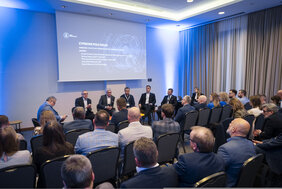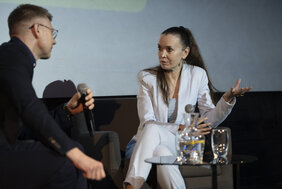THIRD SESSION OF THE SECURITY FORUM 2024
Government and public administration representatives were guests of this year’s session, as well as security managers from ICT, IT, BI and energy sector companies. Among panelists there were also cyber security experts, researchers, as well as the representatives of employers and think tanks.
Representatives of the government and public administration, together with security managers at companies in the ICT, IT, BI or energy sectors, discussed, inter alia, common defense, infrastructure resilience or energy and digital security, among other matters.
In the opening part of the conference, the mayor of Łódź, Hanna Zdanowska, addressed an important message to the participants. "Security is a very important topic from the point of view of us all, and also from the perspective of local governments, which are waiting longingly for the law on the civil protection. These will also be our obligations towards the residents, which we will fulfill and which we must fulfill as soon as possible", she declared.
The introductory speech was given by Deputy Defense Minister Cezary Tomczyk, who spoke about the strategic perspective and the importance of civilian and military cooperation.
"Security issues have become a priority at every level of the state activity. Both in terms of local government, the state level, and companies. Every element of our space today is subordinated to this priority" - the deputy minister said. "In the event of a threat, you it is not that the military defend themselves, it is the state and every part of it. We have a lot to do together, also in schools, offices and companies. What is needed is exercise and a review of procedures. Each of us can contribute to this regard”, he stressed.
The full-scale war in Ukraine, the armed conflict in the Gaza Strip or the growing unrest on the border with Belarus are generating numerous discussions not only about the general defense of Polish society, but also about energy security, so important to the functioning of the state. The importance of strengthening the critical infrastructure, amid diverse threats, was discussed by Gen. Radosław Kujawa, the secretary of state at the Prime Minister’s Office and the deputy coordinator of the Special Services, and Witold Drożdż, the board member for Strategy and Corporate Affairs at Orange Polska.
"Without a very strong “immune system” built up, within which the state obviously must be prioritized, I cannot imagine the functioning of any complex business at present. In case of a serious problem with power supply industries connected to new technologies as well as the digital sector simply cease to exist. Despite the application of solutions meant to optimize the use of electricity, we are doomed to a rather exponentially increasing consumption of energy," Witold Drożdż said. "The intervention and involvement of the state are most appropriate in view of the challenges we face," he added.
The topic of another panel discussion at the Security Forum was the protection of the so-called whistleblowers, whose activities are also aimed at the increasing of public security. As in the case of cyber-security, work is underway to revise regulations in this area. Delaying the implementation of the new law exposes Poland to, inter alia, penalties from the European Union.
As Sławomir Chmielewski, the director of Security and Compliance at Orange Polska, emphasized, there is a lack of discussion on the whistleblower law.
"We may be implementing the new legislation mainly to avoid even higher penalties from the EU," Chmielewski said.
He also noted that in recent years there has been no political will to address changes to the law protecting whistleblowers. Since 2021, at least nine drafts of the law have been submitted to the Parliament, but none of them has been implemented.
The afternoon session featured a panel moderated by Mateusz Komorowski, on the protection of economic interests. The panelists touched on the preparation of services, challenges and the need to coordinate efforts to combat economic crime.
As Paweł Pik of the Regional Prosecutor's Office in Gdańsk emphasized, one of the major dangers is the high complexity of economic crime that investigators must deal with.
Paweł Chomentowski, the Deputy Head of the Internal Security Agency, spoke about the areas of interest of the special services, which include particularly: "the supervision and verification of the situation in state-owned companies and monitoring the situation outside the country, as it affects the situation of the Polish business, even in the context of petty crimes."
Securing the situation of state interests from the perspective of the fiscal control services was pointed out by Zbigniew Stawicki, Deputy Head of the National Treasury Administration (KAS).
"In 2017, the Treasury Control Service was abolished, which had a narrow specialization, as it dealt with, inter alia, securing the interests of the state. Without the fiscal control service, it will be difficult to secure the interests of the State," Stawicki said.
Agata Furgała, from the Ministry of Internal Affairs and Administration concluded the discussion by saying that the solution for the challenges connected with the protection of economic interests could be the cooperation between state entities and business and social partners, to jointly monitor and counter threats generated by crime.
On the second day, the Security Forum concluded with a debate entitled: "NATO. European Union. Secure Poland." As its participants said, the countries of the European Union must take much more responsibility for defense than before. The war in Ukraine and the changes in the global geopolitical system require a new perspective on security matters.
The Russian invasion on Ukraine and global geopolitical changes mean that Europeans' attitudes toward security must change. Until a few years ago, the perception was that the role of the European Union was primarily to build wealth, and that NATO was responsible for defense. The war in the East and uncertainty about U.S. policy have proven that such an approach is no longer justified.
"We are facing an interesting syndrome of role swapping. The European Union is beginning to focus on defense issues," Professor Irena Lipowicz, a member of the Program Council of the Security Forum Foundation, said during the debate.
According to Professor Lipowicz, in the new geopolitical reality, one of the key issues for the European Union is the construction of a "democracy capable of defense." This is a major challenge, because democratic states are not inherently aggressive and, unlike dictatorships, they do not treat external aggression as a tool enabling their existence and expansion. This is because of voters who are interested in freedom and prosperity.
The participants of the debate agreed that the war in Ukraine has increased awareness of the need to change the European Union's security model, because NATO in its current formula may not be able to cope with its role. The alliance's three largest armies belong to countries outside the European Union: the US, Turkey and the UK. Aside from the British, who have the strongest ties to Europe, the interests of key NATO members may diverge from those of the European Union, as recent years have shown.
According to the former head of the Internal Security Agency, General Krzysztof Bondaryk, the present priority for Poland and the European Union is border security and effective deterrence of Russia. The armed conflict across our eastern border is very dynamic and its outcome cannot be predicted today.
Although the European Union is not directly involved in the war, it must contend with the growing pressure of illegal migration supported by Russia and Belarus. Therefore, the key issue that needs to be discussed is the growing migration crisis.
"This is not a question of populism, it is a question of reality - whether an island of democracy such as Europe can withstand a wave of uncontrolled migration, organized by dictators," - Krzysztof Bondaryk stated.
Another aspect of security challenges was highlighted by Renata Mieńkowska-Norkiene PhD, the chairwoman of the Program Council of the International Institute of Civil Society. According to her, discussion of problems and challenges often focuses on side topics. An example is the recent crisis in the grain market, the causes of which were mainly sought in Ukrainian grain imports and the European Green Deal.
"In the Polish narrative, it is very rarely heard that the decline in global grain prices was actually primarily the fault of Russia. Russia stole Ukrainian grain and then sold them on world markets at very low prices," Renata Mieńkowska-Norkiene said.
The Security Forum is an annual two-day event for experts managing security area in the public, non-governmental and private sectors. The main topic of the 3rd session of the event covered all the front lines, starting from the need to increase the common defense system, ensure resilient infrastructure, energy and digital security, to the protection of whistleblowers, control of migration flows or the social costs of living in the shadow of war.








































